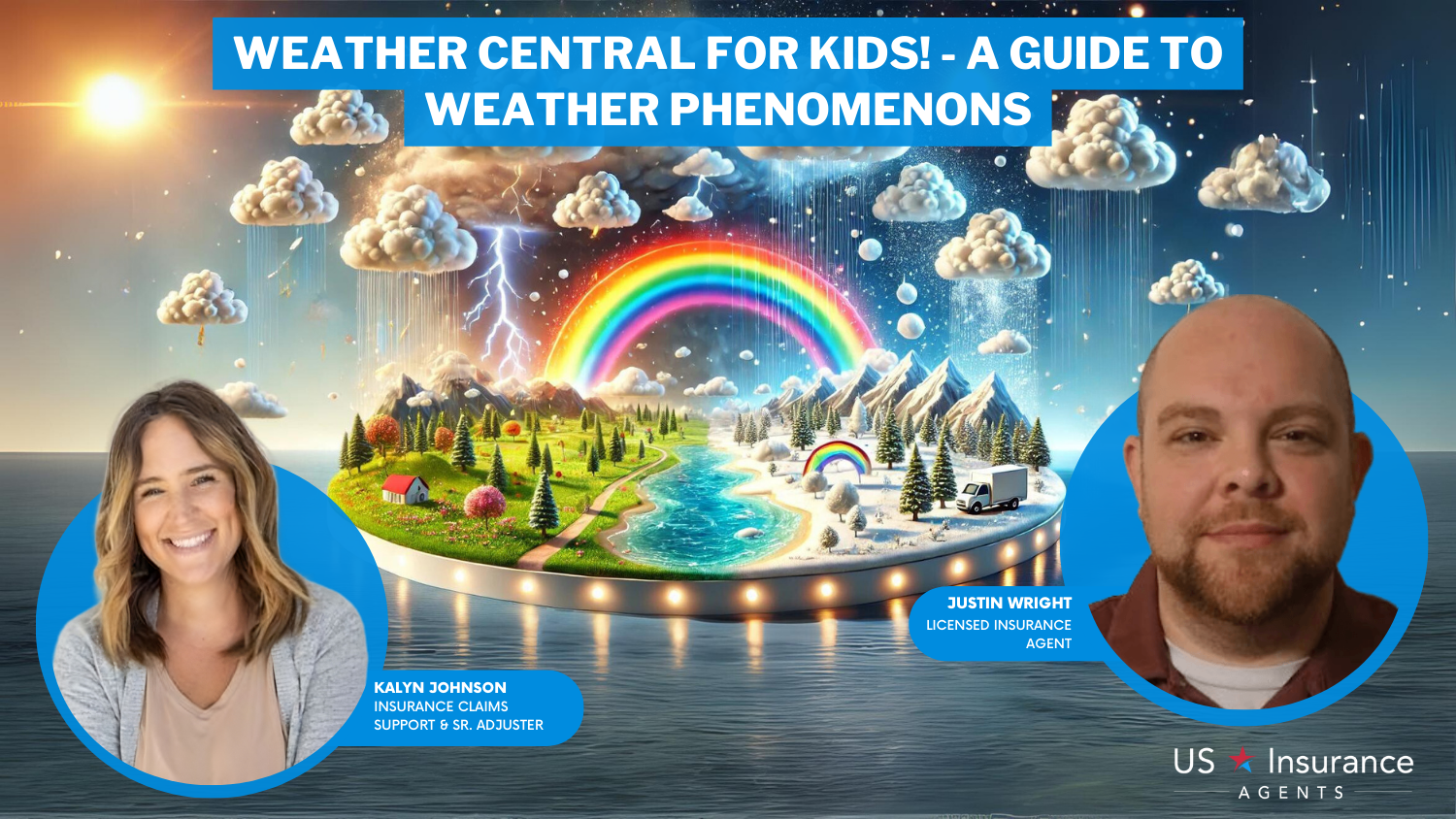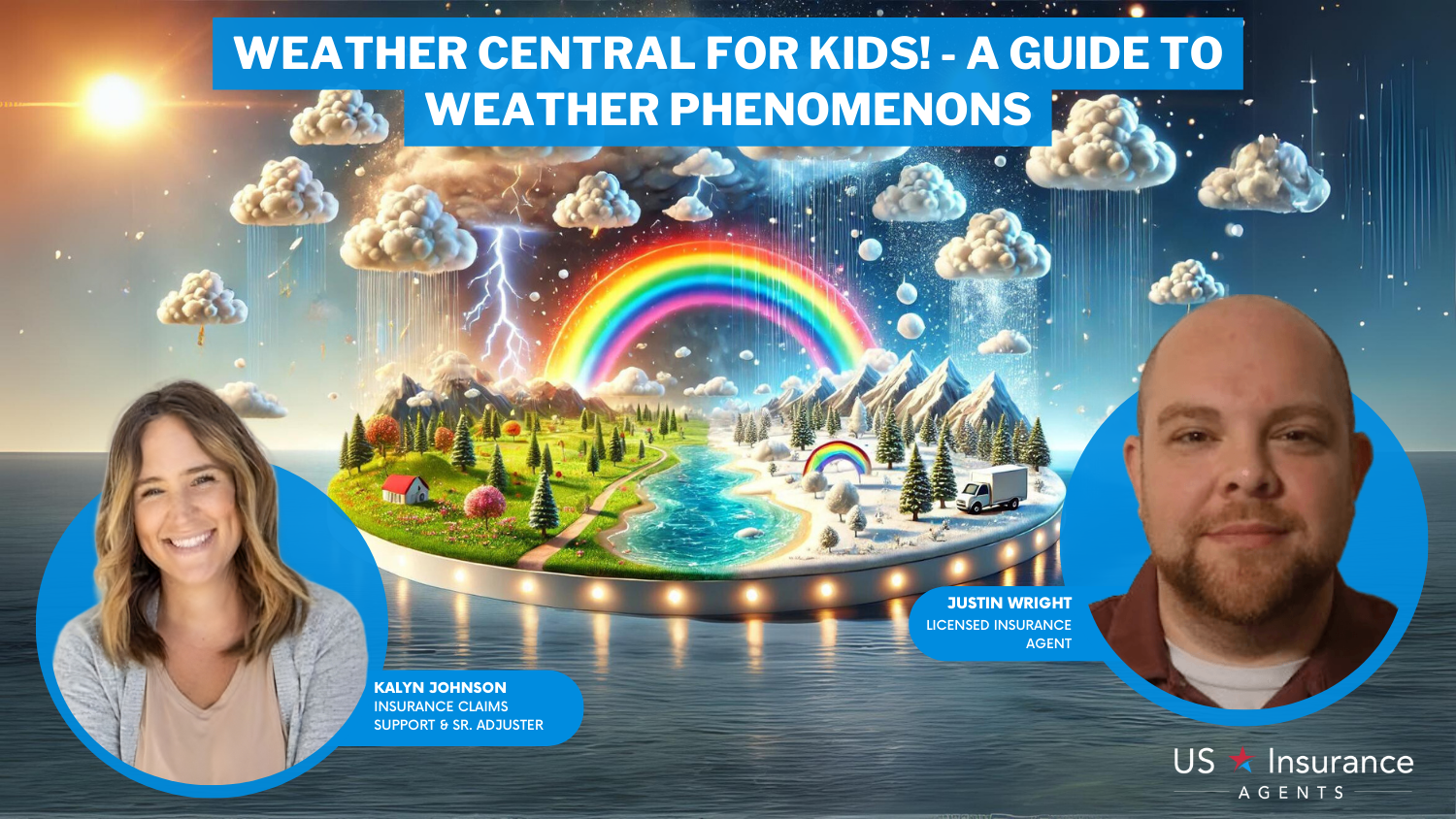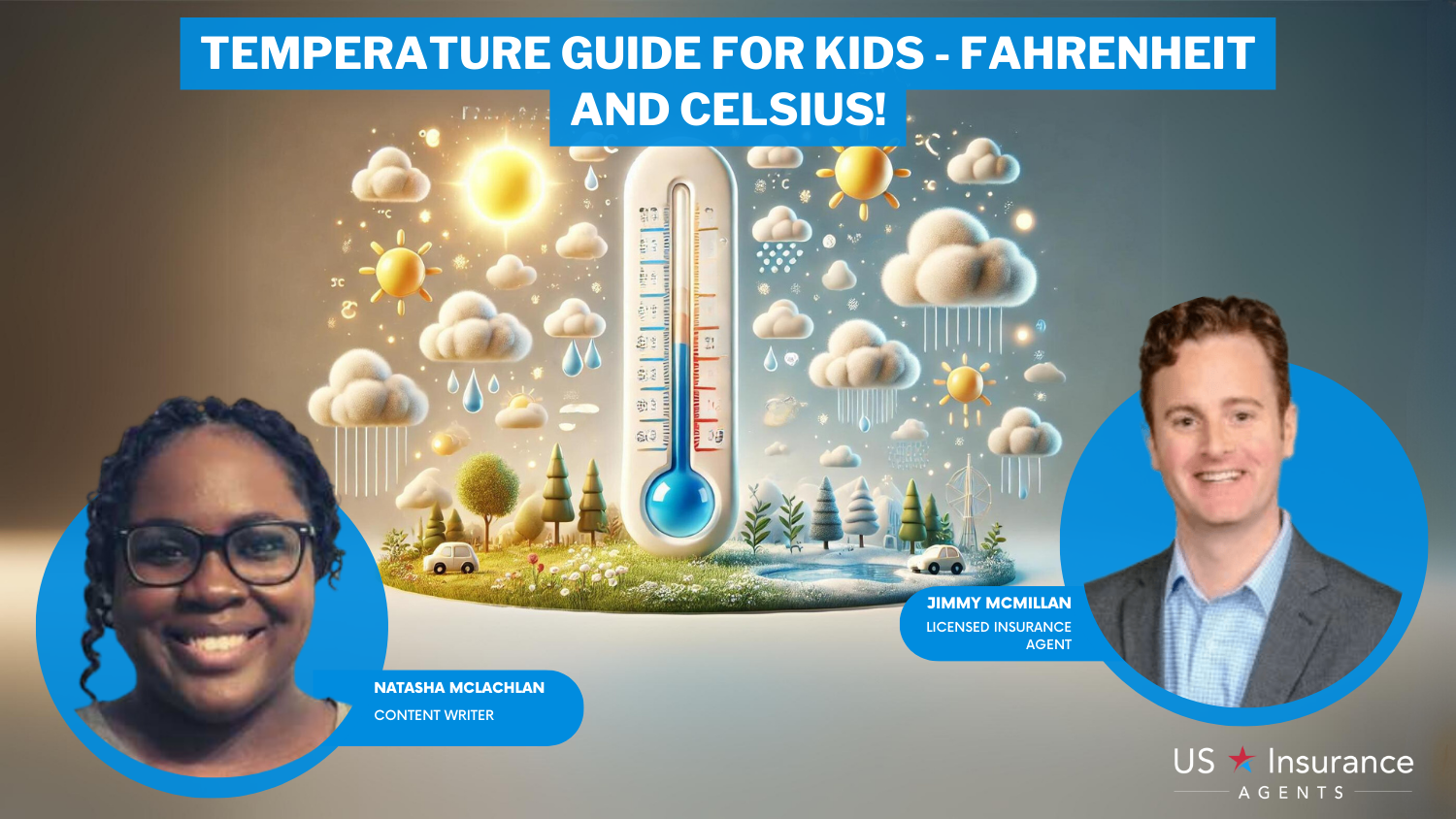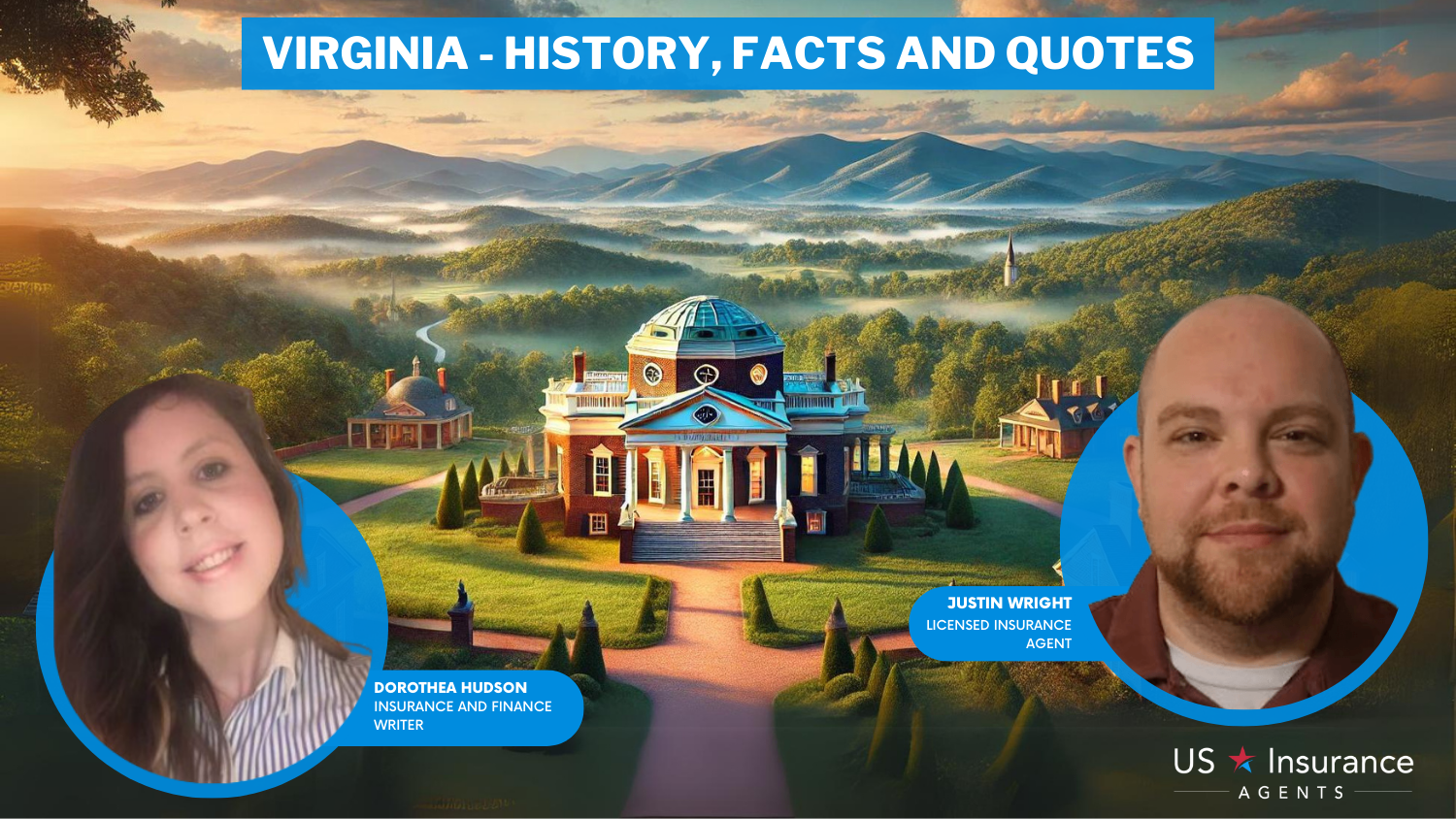Weather Central for Kids! – A Guide to Weather Phenomenons
Delve into the captivating world of weather with "Weather Central for Kids!" - a comprehensive guide to understanding weather phenomena and insurance coverage for various weather events. Discover expert insights, engaging content, and expand your knowledge on meteorology, natural disasters, and how insurance can protect you. Unleash your curiosity and embark on a learning journey through interactive explanations, stunning visuals, and practical tips.
Read more Secured with SHA-256 Encryption





Table of Contents


Insurance Claims Support & Sr. Adjuster
Kalyn grew up in an insurance family with a grandfather, aunt, and uncle leading successful careers as insurance agents. She soon found she has similar interests and followed in their footsteps. After spending about ten years working in the insurance industry as both an appraiser dispatcher and a senior property claims adjuster, she decided to combine her years of insurance experience with another...
Kalyn Johnson


Sr. Director of Content
Sara Routhier, Senior Director of Content, has professional experience as an educator, SEO specialist, and content marketer. She has over 10 years of experience in the insurance industry. As a researcher, data nerd, writer, and editor, she strives to curate educational, enlightening articles that provide you with the must-know facts and best-kept secrets within the overwhelming world of insurance....
Sara Routhier


Licensed Insurance Agent
Justin Wright has been a licensed insurance broker for over 9 years. After graduating from Southeastern Seminary with a Masters in Philosophy, Justin started his career as a professor, teaching Philosophy and Ethics. Later, Justin obtained both his Property & Casualty license and his Life and Health license and began working for State Farm and Allstate. In 2020, Justin began working as an i...
Justin Wright
Updated October 2024

Welcome to Weather Central for Kids! – A Guide to Weather Phenomenons. In this comprehensive guide, we’ll take you on an exciting journey to explore various weather phenomena and gain a deeper understanding of how they impact our lives.
From thunderstorms and hurricanes to tornadoes and blizzards, we’ll unravel the mysteries behind these natural wonders. Our expert insights will provide you with valuable information on insurance coverage for weather-related events, ensuring you’re well-prepared for any unexpected situations. To safeguard your home and belongings, it’s crucial to have the right insurance in place.
Enter your ZIP code now to compare rates from the best insurance providers in your area and secure the coverage that fits your needs. Don’t miss out on this opportunity to protect what matters most to you.
Clouds
There are four primary classifications for clouds: cumulus, stratus, cirrus and nimbus. It’s easy to tell the different types of clouds apart from one another – just look at the shape! Cumulus clouds are big, puffer shapes that appear to be giant marshmallows; cirrus clouds are very thin and wispy; stratus clouds appear layered on top of one another; and nimbus clouds are dark and heavy in appearance, usually indicative of an impending rain. Clouds can also be classified as a hybrid between two types, like nimbostratus, or by the height of the cloud itself. For example, there are low-level clouds, mid-level clouds and high-level clouds. Measurement starts at the base of the cloud formation.
- Types of Clouds
- Picture Presentation of Cloud Types (PDF)
- Introduction to Cloud Types
- The Formation of Clouds
Flooding
Flooding occurs after natural disasters, like hurricanes, tornadoes and tsunamis, and the resulting water can be devastating in more than one way. Aside from the obvious risk of drowning in deep, fast moving flood water, mold is also a very real danger – especially for those who have existing respiratory problems. Additionally, flood water is often contaminated with harmful chemicals and other pollutants that it carries with it, which makes it unsafe to touch or consume. It’s very important to evacuate the area if there is a flood warning, and stay on high ground until the water is under control.
- How to Act in the Event of a Flood
- Causes of Flooding
- Impact of Floods
- Map of Current Global Flooding
Hurricanes
A hurricane is a very powerful type of storm, with spiraling winds, that carries water with it. Although hurricanes primarily stay over the ocean, they do come on land, as well. When this happens, they can wreck entire communities with their strong winds and subsequent flood waters. The strong wind in a hurricane travels inward and in an upward direction; this combination of direction and strength is what enables a hurricane to rip roofs off of houses. A hurricane will always start over the ocean, and the water temperature has to be 80 degrees Fahrenheit or warmer for this to happen. They are categorized on a special scale from 1-5, and there are six stages of a hurricane: tropical wave, tropical disturbance, tropical cyclone, tropical depression, tropical storm, and finally, hurricane.
- National Hurricane Center
- What are Hurricanes?
- An Explanation of Hurricanes and Their Relation to the Equator
- Hurricane Fact Sheet
Thunderstorms
The majority of thunderstorms are the result of a cold front. However, storms can also be associated with other types of weather fronts, as well. Most of us are familiar with thunderstorms – they’re a very common weather phenomenon. But do you know how to stay safe in a storm, whether you’re caught outside, driving with your parents, or just sitting inside your home? Staying away from metal objects is one of the most important things to remember in a thunderstorm that also contains lightning. Additionally, if you’re at home during a storm, make sure you don’t take a shower or a bath until the storm blows over.
- Classification of Thunderstorms
- Introduction to Thunderstorms
- Stages, Types and Hazards of Thunderstorms
- Understanding Thunderstorms and Lightning (PDF)
Tornadoes
Tornadoes are a type of very powerful storm that can develop out of a thunderstorm. They occur as an eastward moving cold front approaches. Although some tornadoes occur without causing very much damage, they can turn into extremely violent storms very quickly – the wind speed in a tornado can reach all the way up to 250 miles per hour. In fact, some tornadoes move even faster than that! To put this into perspective, that’s almost double the speed that a typical family vehicle can achieve. There are three classifications of tornadoes: weak tornadoes, strong tornadoes, and violent tornadoes.
- Facts and Myths about Tornadoes
- Basic Explanation and More Resources on Tornadoes
- How to Stay Safe During a Tornado
- How to Stay Prepared for a Tornado (PDF)
Space Weather
When the magnetic fields, radiation levels, and orbiting matter that lies in between the Earth’s atmosphere and the Sun’s atmosphere experience changes, the resulting phenomenon is called space weather. There are three different types of storms that occur in space: geomagnetic storms, solar radiation storms, and radio blackouts. Each type of space storm is rated on its own scale. For example, geomagnetic storms are rated on a scale from G1-G5, with G5 being the most severe. On the Earth, severe space weather conditions can cause blackouts, interfere with satellites, and cause migratory problems in animals.
- Current News and Information about Space Weather
- Space Weather Resources for Further Learning
- Animations, Data and Resources on Current Space Weather
- What is Space Weather?
Rainbows
A rainbow, in the simplest terms, is an optical phenomenon caused when light reflects and refracts on droplets of water. Although we associate rainbows with the huge phenomenon that can be seen in the sky after it rains, you can also see a small rainbow when the sun is passed through any moisture in the air – you can see this for yourself by misting a spray bottle into the air on a sunny day. Although we can easily see seven colors in a rainbow, each one is actually made up a huge spectrum of colors that our eyes cannot detect. The seven colors that we commonly associate with rainbows are as follows: red, orange, yellow, green, blue, indigo and violet. This color sequence is often remembered with the pneumonic device ROY-G-BIV.
- Science Behind Rainbows
- Introduction to Primary and Secondary Rainbows
- How Rainbows Work
- Rainbow Lesson Plan
Weather Forecasting
Weather forecasting is a science that allows us to predict weather conditions in advance. For example, we can detect cold fronts before they start to advance. Weather forecasting is a very useful application in that it gives us the opportunity to react to natural disasters before they strike, which can save many lives. Additionally, we can also issue weather alerts based on these scientific reports. There are five primary methods of predicting the weather: the persistence method, trends method, analog method, climatology, and numerical weather prediction.
- Methods of Predicting Weather
- Severe Weather Forecasting Activity
- How to Forecast Weather without Instruments
- Forecasting Under Pressure Activity for Kids
- Weather Predication Resources and Activity Sheet for Kids (PDF)
- Weather Data and Tools for Kids
Winter Storms
Although most of us look forward to playing in the snow, the storms that bring snowfall can turn into a deadly phenomenon pretty quickly. For example, a snowstorm can turn into a blizzard, which is a storm that has very heavy snowfall, freezing winds, and sleet. Ice can form regardless of the severity of the snowstorm that your area is experiencing provided that the outside temperature is low enough. It’s very important to stay off the roads during a heavy snow storm to avoid accidents, and you should always make sure that your house is stocked up on non perishable food items that will last you at least several weeks in the event of a debilitating blizzard.
- Winter Storms
- Get Prepared for Winter
- Winter Emergency Information
- Resources on Winter Storms
Weather Fronts
Weather fronts are a key part of analyzing and predicting future weather. A front is the area between two different densities of air. Sometimes, it can be very difficult to identify a weather front from the ground because the boundary between the air masses is not apparent. They’re easiest to spot when the air masses on either side differ greatly in density, temperature and humidity, because these differences create a very distinct divide. There are four kinds of weather fronts: cold fronts, warm fronts, stationary fronts, and occluded fronts.
- Explanation of Stationary Fronts
- What is a Weather Front?
- How to Identify Weather Fronts
- Introduction to Weather Fronts
- How to Read Weather Maps

Frequently Asked Questions
What is weather?
Weather refers to the current state of the atmosphere, including temperature, humidity, precipitation, wind, and other atmospheric conditions in a specific location at a specific time.
What are some common weather phenomena?
Some common weather phenomena include thunderstorms, tornadoes, hurricanes, blizzards, heat waves, and cold snaps.
How are weather phenomena measured?
Weather phenomena are measured using various tools such as thermometers, barometers, anemometers, rain gauges, and satellites.
What is a thunderstorm?
A thunderstorm is a weather phenomenon that is characterized by lightning, thunder, and heavy rain. Thunderstorms can also produce hail and strong winds.
What is a tornado?
A tornado is a violent, rotating column of air that extends from a thunderstorm to the ground. Tornadoes can cause significant damage to buildings and other structures.
What is a hurricane?
A hurricane is a large, rotating storm with strong winds and heavy rain. Hurricanes can cause significant damage to coastal areas.
What is a blizzard?
A blizzard is a severe winter storm that is characterized by high winds, low temperatures, and heavy snowfall.
What is a heat wave?
A heat wave is a prolonged period of hot weather, often accompanied by high humidity. Heat waves can be dangerous, especially for the elderly and those with certain medical conditions.
What is a cold snap?
A cold snap is a sudden and significant drop in temperature, often accompanied by strong winds and snowfall.
How can I stay safe during extreme weather conditions?
You can stay safe during extreme weather conditions by staying indoors and away from windows during thunderstorms and tornadoes, following evacuation orders during hurricanes, dressing warmly and staying dry during blizzards, and staying hydrated and cool during heat waves.
How can insurance help protect my home and belongings during extreme weather conditions?
Get a FREE Quote in Minutes
Insurance rates change constantly — we help you stay ahead by making it easy to compare top options and save.







